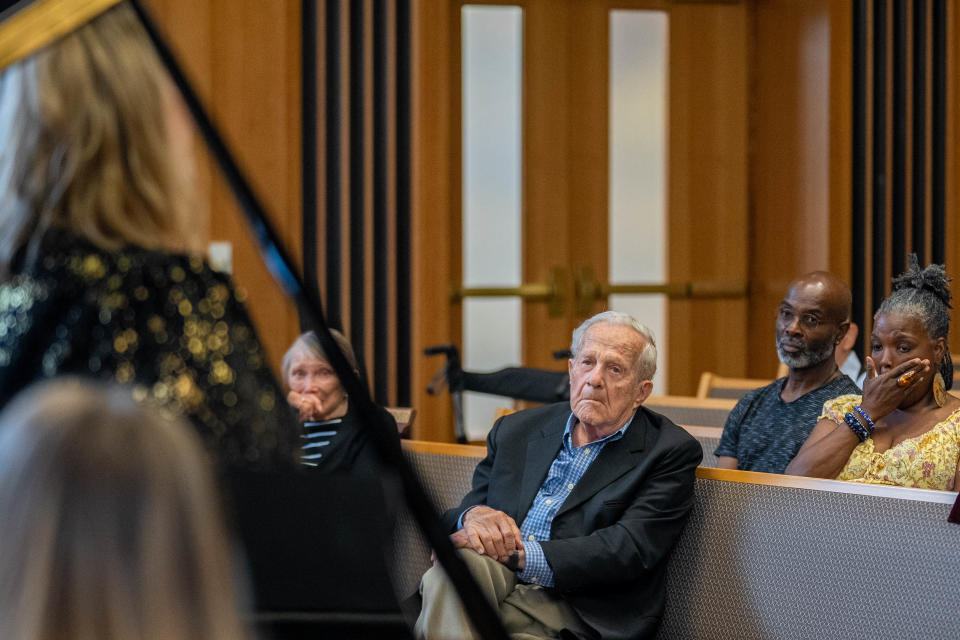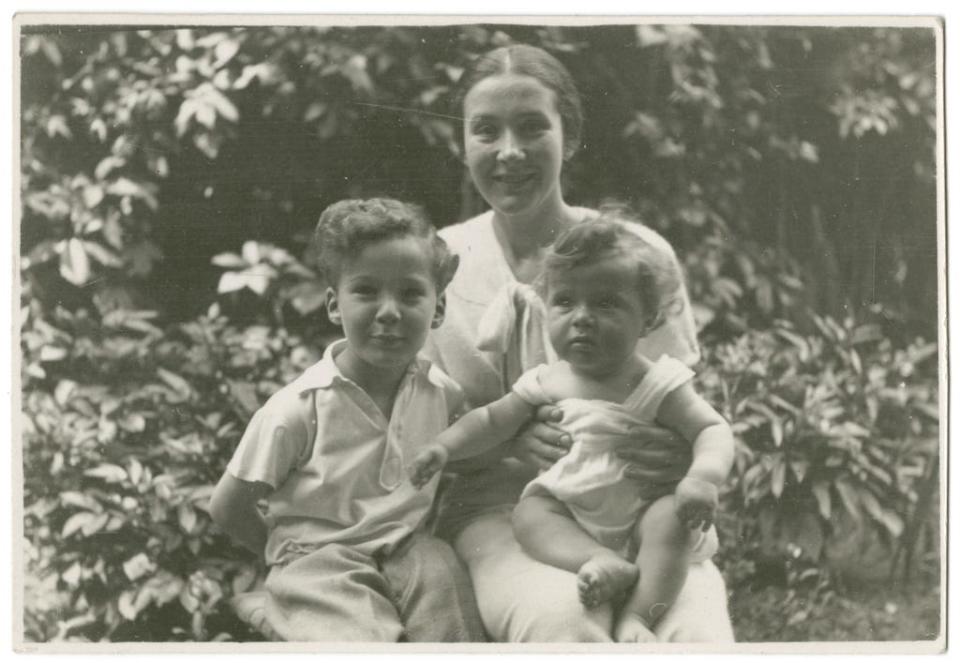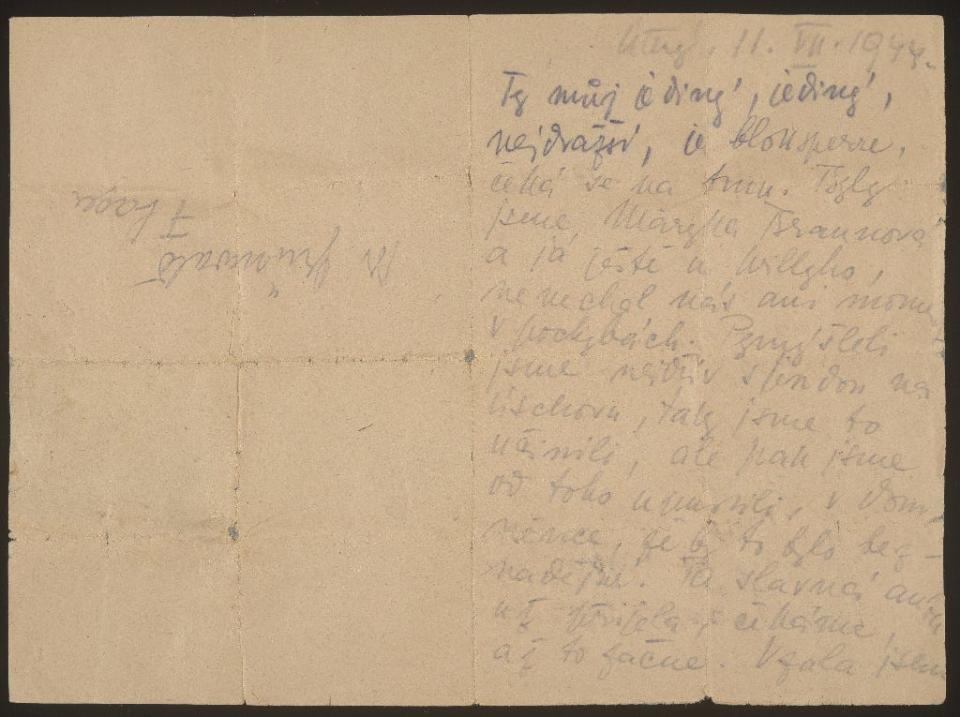A Holocaust letter defied victimhood with love. A mother's last note now lives on in song.
"You, my only one, dearest, in isolation we are waiting for darkness. We considered the possibility of hiding but decided not to do it since we felt it would be hopeless. The famous trucks are already here and we are waiting for it to begin. I am completely calm. You — my only and dearest one, do not blame yourself for what happened, it was our destiny. We did what we could. Stay healthy and remember my words that time will heal — if not completely — then — at least partially. Take care of the little golden boy and don't spoil him too much with your love. Both of you — stay healthy, my dear ones. I will be thinking of you and Misa. Have a fabulous life, we must board the trucks.
Into eternity, Vilma"
---
From his seat at the sanctuary's front, Frank Grunwald's clear gaze held on to the vocalist as she sang some of the final words his mother ever expressed. Around him sat audience members with furrowed brows, tears slipping. Silence followed the final bars before impassioned applause gave way to a standing ovation. Frank reached for his wife's hand next to him as she wiped her eyes.
Almost 80 years ago, in the moments before Vilma Grunwald and her older son died in the Auschwitz gas chambers, she pressed pencil to paper to write Frank's father a letter of comfort. Then she convinced a Nazi guard to deliver it.
Now Vilma's younger son was listening to the words he'd read over and over — this time as a newly composed art song making its world premiere as part of a concert at the Indianapolis Hebrew Congregation.
So remarkable are the letter's resilience and timing on the day of their murder that it remains a unique piece at the U.S. Holocaust Memorial Museum, where Frank donated it in 2012. And now, with the song published by composer Lori Laitman, "Into Eternity" will continue to spread Vilma's unyielding love in the face of devastation.
"It's a letter full of life," Frank said, "by someone who is about to die."
---
"You, my only one, dearest, in isolation we are waiting for darkness."
For more than 20 years after the war, Frank left the words mezzo-soprano Lyndsay Moy performed June 4 unread in his father Kurt's bedside table drawer. Maybe he was afraid of them. Maybe they held too much emotion.
The father and son were rebuilding their lives after immigrating to New York in 1951. Kurt practiced medicine. Frank attended the Pratt Institute, becoming an industrial designer. He relocated to Indianapolis in 1987 for his job and then taught strategic design and creative thinking at Purdue University.

Throughout their successes, they carried the trauma of the Holocaust. And especially of July 6, 1944 — a day as confusing to then-11-year-old Frank as it was life-defining.
On a grassy plot surrounded by barbed wire, he and his 16-year-old brother stood with 200 to 300 other children in front of infamous doctor Josef Mengele. After officers forced them to promenade, the "angel of death" spotted John's limp from an underdeveloped leg. With one brief wave of his hand, Mengele sent the duo to the left.
But in a move so swift it appeared to escape notice, Willy Brachmann, a non-Jewish German prisoner for whom Frank had worked as a messenger, grabbed his left shoulder and shoved him into a group of older boys on the right.
"That's when the light came on," said Frank, now 90. "That's when I realized I was on death row and that Willy just saved my life."
Frank remained hidden, safe in the huddle. Then his mother was there, speaking to him.
She didn't tell him it would be for the last time, that she would go with John so he wouldn't die alone.
---
"We considered the possibility of hiding but decided not to do it since we felt it would be hopeless."
Laitman is a composer practiced in writing for voice, in telling stories of the Holocaust through music.
She first read Vilma's letter in 2022 when she met Frank during Indianapolis Opera's "Brundibar and Vedem." The production married a historic opera children performed in a concentration camp with a contemporary oratorio Laitman composed using young prisoners' underground poetry.
She asked Frank for permission to set his mother's words using his English translation, which he had condensed from the longer letter. Then Laitman gifted the song to him.
"If I knew that I was going to my death, I don't know that I could write that letter. In fact, I'm quite sure I couldn't write that letter," said Laitman, who is a mother and grandmother.
"It has such grace and elegance and … all the important things are there. And how she had the presence of mind to do that is beyond me."
Across six days in the summer of 2022, Laitman tailored the melody to the words and turned passages of it into musical motifs. The musical phrase set to "since we felt it would be hopeless" — an emotional upward sweep, almost a cry — repeats throughout the song as what she called an underbelly.
After that fateful July day, Frank fought hopelessness with denial. In their last conversation, Vilma, 39, had told her youngest son to find her brother in New York if he survived.
"She was not emotional. She spoke in a very practical way. She gave me a hug," Frank said. "I would have never thought that this was the last goodbye. She didn't give me that impression at all. And yet she knew that that's what it was."
Two months later in September 1944, Frank received a pass to visit his father in the medical camp where he worked as a doctor.
"I realized that he was a total emotional wreck. He was just totally emotionally gone," Frank said. "When we started to talk about my mother and John, I could see tears coming down his face."
Kurt didn't tell his son they'd been killed until after liberation. But he had received his wife's July 11 letter by then, delivered by a guard whom the intuitive Vilma, who spoke fluent German, identified as willing to perform the task.
---
"The famous trucks are already here and we are waiting for it to begin. I am completely calm. You — my only and dearest one, do not blame yourself for what happened, it was our destiny. We did what we could."
Vilma's calm has been a harbor for her family — and for Moy as she prepared for the world premiere.
"The first time I read it, I cried ... I had chills and I was just like, 'Oh my gosh, how am I going to do this?'" said Moy, the education and outreach director for Indianapolis Opera, a partner in presenting the concert.
"But so much of that, honestly, has been by putting myself especially into that calm place."

Unlike the dramatic climb of "hopeless" earlier, the motif of "I am completely calm" soothes like a lullaby, Moy's voice moving through it like warmth from a sip of wine. Pianist Maria Lyapkova, in instrumental interludes and with Moy, captured the psychological layers beneath the words, extending Vilma's energy.
Frank's mother grew up in and around Prague and attended finishing school in Switzerland. She devoured novels and essential reading of the day. She played four-handed pieces with her husband on a German piano later taken from them during the war.
Vilma believed in a universal God, not necessarily one who was Jewish or Christian. She was her boys' ethics coach. She told them to judge people by their actions, not their income.

And Vilma didn't complain. Not when she had to sleep on the floor of the Terezin ghetto-labor camp for more than a year before Auschwitz. And not in her letter to Kurt.
"Keep your chin up," she'd tell them.
---
"Stay healthy and remember my words that time will heal — if not completely — then — at least partially. Take care of the little golden boy and don't spoil him too much with your love."
Sadness cascaded over Frank the first time he read the fading graphite curves of his mother's handwriting after his father's death in 1967. But so did his mother's positivity.
He'd never heard her call him "the little golden boy" before, he said, eyes gleaming with the pleasure of feeling a parent's pride. Laitman repeats the phrase twice in the song.

"Music certainly does give it a whole different dimension," Frank said after the performance. "I think it might also strengthen the emotional content of the letter."
He would like to hear it again. Maybe someday with an orchestra as Vilma's words continue to spread. In April, composer Marion von Tilzer presented a her own setting of Vilma's words in Amsterdam.
Each performance of the letter allows Frank — known as Misa when he was a child — the chance to share his mother's superpower of gentleness that would not bend to bitterness.
"She simply refused believing in an identity of a victim," he said. "It just didn't exist in her mind."
"Both of you — stay healthy, my dear ones. I will be thinking of you and Misa. Have a fabulous life, we must board the trucks.
"Into eternity, Vilma"
'Into eternity': Vilma Grunwald did not survive the Holocaust, but her words did
Contact IndyStar reporter Domenica Bongiovanni at 317-444-7339 or d.bongiovanni@indystar.com. Follow her on Facebook, Instagram or Twitter: @domenicareports.
This article originally appeared on Indianapolis Star: Mom's Holocaust note defied victimhood with love. It lives on in song

